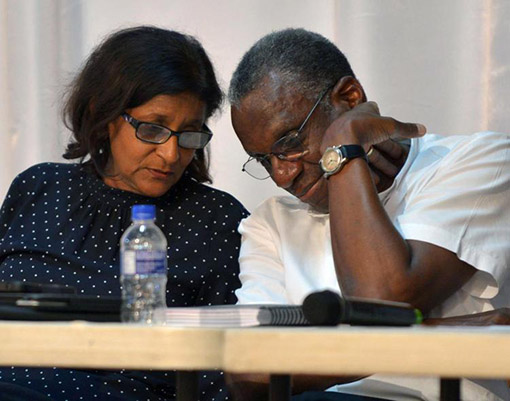(Trinidad Express) The closure of the Petrotrin refinery is a crisis, it is tragic, but it presents an opportunity for Trinidad and Tobago, says economist Dr Terrence Farrell.
Farrell said it was now the responsibility of the Government to create opportunities for those workers who have been displaced.
He was speaking at a public forum on the closure of the Petrotrin refinery hosted by the Lloyd Best Institute at City Hall, San Fernando, on Wednesday.
Farrell said governments, past and present, had failed this country. He said the system being operated was not working for Trinidad and Tobago. “The country has too high a level of poverty for a country that is supposed to have so much resources. The country has too much and too high levels of income and wealth inequality for a country that has so much resource and so much potential. The country’s production level are too low for a country that has so much resource and so much potential,” he said.
Farrell said the closure of the Petrotrin refinery was no different to the closure of Caroni (1975) Limited. He said it presents the country with an opportunity to introduce solar energy, wind power and convert this country’s transportation system.
But it also presents an opportunity to the displaced worker, he said.
“Because there is opportunity for creating business and the government has to stop this focus on these mega projects. Government is not interested in hearing anything unless it costs hundreds of millions of dollars. Why? Because it sounds politically good and because the bigger the project is the bigger it is that people could siphon money off the side,” he said.
Farrell said the government needs to find ways of activating entrepreneurship among the hundreds of young people.
He said oil and sugar were iconic industries for Trinidad and Tobago. But citizens should understand that nothing lasts forever.
“The stone age didn’t end because a lack of stones and the oil age is not going to end because of a lack of oil. There is plenty of natural gas and oil in the ground when the planet has stopped using fossil fuels to generate energy,” he said.
Farrell said creative destruction happens when technological progress destroys industries in the process of creativity of making and creating new things. He said jobs would disappear.
Farrell recalled that economists had known that the sugar industry was terminal for at least 30 years. But government, he said, continued to invest in the industry to save the jobs of so many workers.
“Because a job is for the employee the source of income what puts food on their table, what pays their mortgage, allows them to have a decent standard of living. A job is really something that produces value. If it does not produce value there is no job,” he said.
But then the costs begin to pile up and it becomes indelible and taxpayers can no longer bear the costs, he said.
Director of the Lloyd Best Institute Sunity Maharaj, speaks to economist Dr Terrance Farrell during a public forum on the closure of the refinery of state owned Petrotrin, at San Fernando City Hall on Wednesday.
Director of the Lloyd Best Institute Sunity Maharaj, during her contribution at a public forum on the closure of the refinery of state owned Petrotrin, at San Fernando City Hall on Wednesday.
Farrell said it was now government’s responsibility to invest the revenues and not farm them out into consumption.
“The point we make as economists is simply this that when you do that, when you expend resources and you waste resources like that it does not come back, it lost forever,” he said.
Sunity Maharaj, director of the Lloyd Best Institute, said it should not be left up to the Oilfield Workers Trade Union (OWTU) to debate closure of the refinery at Petrotrin.
She said Petrotrin was not a private company, operated solely by the board of directors.
Maharaj said the board of directors at Petrotrin was simply managing the assets and resources on behalf of the people of Trinidad and Tobago. And it was necessary for all stakeholders including the business community and all citizens to come forward.
“It is the responsibility of citizens. The beginning of the birth of a nation that if we do not build on this moment to change the future behaviours of those who represent us and those who manage businesses in our names we would be right back here. This is a debate that needs to take place before and ought not be left up to the OWTU. If only for the principle of taking responsibility and holding those who represent us to account,” she said.
Maharaj said the decision to close a state enterprise should not be solely a Cabinet or Board decision.
“I feel for the workers because I see the pain and can feel the fear. This issue about Petrotrin, I don’t think it is about the refinery. I think it is about the burden of adjustment. There is an adjustment to be made and the burden is falling completely on the workers,” she said.

